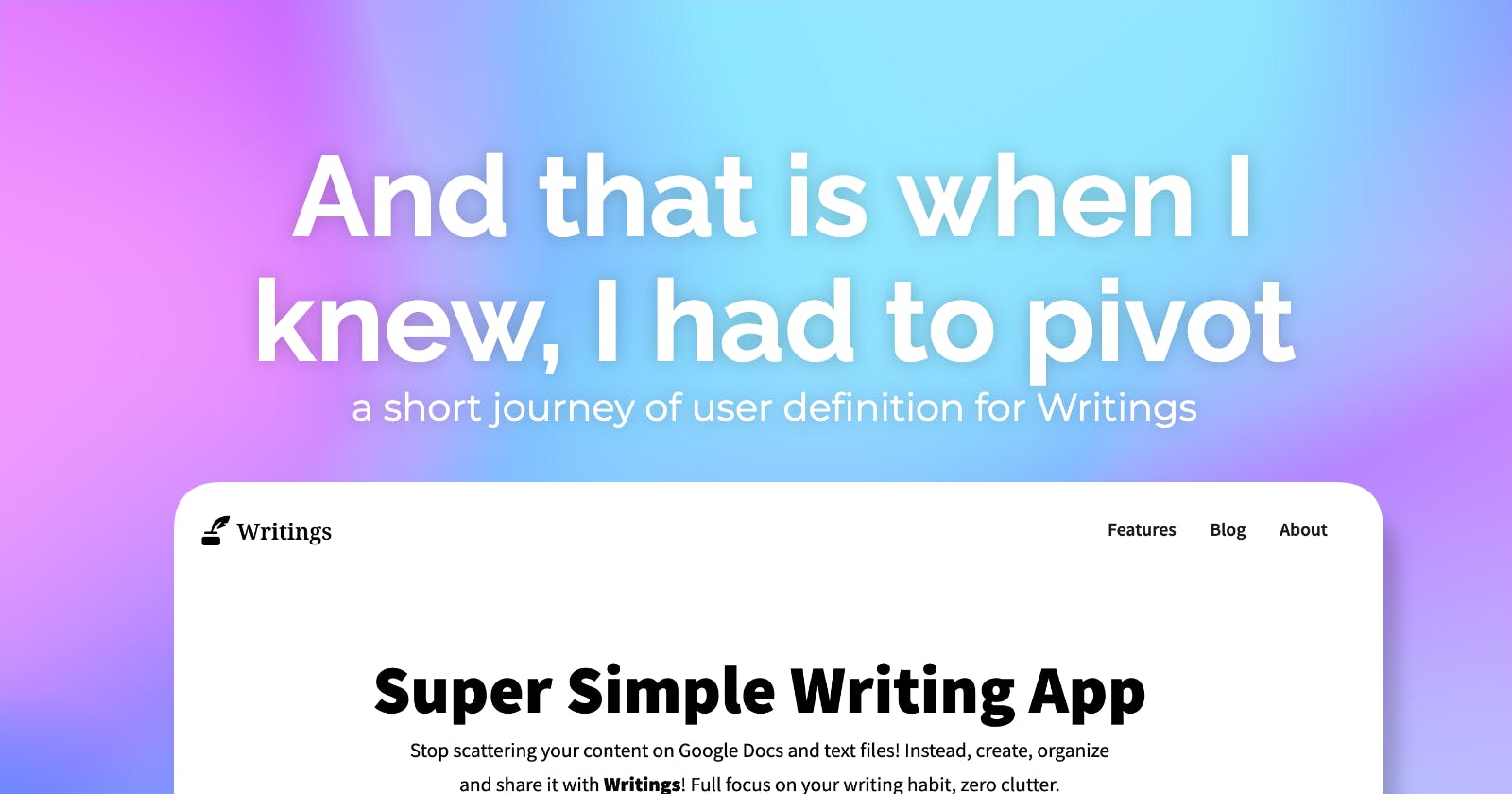And that's when I knew I had to pivot...
The process of learning to niche down by talking to people.
Hi there 👋 I am Aleksandar and I am building Writings. Simple tool to write, organize and share your content. Hope you enjoy this article.
I spend the past time talking with content creators and users of writing apps. My goal is to understand what is the motivation of these people to write and what is their cognitive process when they make decisions about the software they choose.
Learning where to look in order to find these users was quite annoying. First, because I had to find the communities where these users hang, and second because exploration is never enough, so even now, after having more than 20 rounds, it still feels like I need more.
On top comes the fact that once I found and identified them, I started collecting feedback that did not go along with what I expected. Having honest conversations opens you up in front of people and makes you and what you're building vulnerable. This process drained me emotionally. But I found the feedback more valuable than any other as it comes from people that are already on the field and know the game (a knowledge I lack).
I got involved in 2 Facebook groups for writers and a few writing subreddits. I also talked to Twitter users that are already writing and publishing content.
The definite ‘No!’
The unknowns started with me acknowledging that I don't know who I am building for. Mentally that put me months behind, but good that it happened. Once I admitted it to myself, I started exploring the subject that should use Writings. Is it a writer?
I got to know what a writer is through the Facebook groups I got part of. I started by asking questions and sharing some of my content on these pages. I wanted to ensure that my intentions were not to take advantage of their knowledge and experience but rather to learn. I never mentioned what I was building.
The members of these groups know a lot about writing as a process and topic in general. Being there in just a few weeks burned the idea that this was a group of users that I was after. I discovered what a writer is and why a writer is not my product target.
So what is it?
Looking for a way to define what a writer is nowadays, there is a very present clash of generations. A writer takes time to prepare for a topic that they'll write about, and that step can last as long as it's needed. Their typical audience is months, if not years, away. They are not bothered if an audience runs away or if there will be an audience to monetize. I guess this questions come in perspective later, but at the beginning their full focus is on the material.
The process itself looks quite configurational, meaning that the tools they use are considered a framework only. They do not experiment with software if they have already functioning tools. As a matter of fact, most of those that I talked to use MS Word or LibreOffice. The point that proves that they don't care about features is that few of them said that they use both LibreOffice and MS Word because the first gives them better font rendering, and the latter has better grammatical correction features. None said that they use Grammarly or similar tool for autocorrection or paraphrasing.
So, in that regard, it's difficult to push for a change as the importance of the software they use is secondary (if not even with less priority). Some of them would rather use a typewriter.
The more I observed their posts, comments and answers, the more I understood that I was in the wrong gang. I am not after users that do not experiment with solutions. I need someone willing to show their work much sooner than the 2 years novel writing process of the typical writer.
Another harsh reality is that those that use apps other than MS Word pay almost nothing for them. Well, they cost something, but often that's a one-time purchase of $50 or so. As a comparison, one of the best writing apps out there, called Scrivener, costs $49, and if you are a writer, it's truly amazing. Or Calmly Desktop (which costs $10.99 for a one-time license for 3 computers) —whatever works. But for them a subscription model is not an option.
The overall feeling was - this user group is not for me.
The sort-of ‘Yes’
Once I was done with this group, I started thinking about who else writes and how they do it. Does everyone write novels and books? No. Do the ones that don't write novels and books write blogs and atomic essays only? No. Then who is in the middle?
These:
Hyperactive writers - the name is mine. These are all the folks that want to write but still haven't identified their need, form, or audience. Should it be a blog, or should it be a newsletter? Long-form or short-form? Fiction maybe? This is the group that is after writing cohorts. They and don't mind paying for them but haven't a clear goal of why they want to do it. Also, this group often starts using what they are told to use during these courses. Taking to them, they provide feedback that is always super positive, but it contains very few actionable points from which I could learn; in other words, they are too kind;
Journaling users - if we generalize, we can see that they do their writing therapeutically. They are always talking about the benefits of writing on our mental health, how journaling has helped them a lot and why you should start journaling. Their demands are quite easy and clear. They have a form they follow and are more spiritual about their writing habits than anybody else. They would try new products but, in general, would not pay for something that does not really resonate with them. And this reflects the 1000 journaling methods that exist out there in one or another form of sensationalism;
Copywriters - professional writers and one of the most difficult groups to talk to. Not because they belong to some stereotype but because most of them take writing very seriously. And it's expected, as they write professionally and pay their bills by doing it. Their needs are very specific, and the margin for error is very small (imagine you throw an exception while finishing a 7000 words article worth $4000 —I feel they'll sue you). I had the chance to talk to just one copywriter during my process, and they said that modern copywriters would never use a writing app without AI features. I cannot 100% say if this is true or not. Feature idea marked, but for now: not part of my MVP.
Of course, there are many more types of writers, but for me, this was quite enough to narrow down the target.
Finally something
Then in the chaos of talking and randomly jumping into people's chats and DMs, I started picking up on some interesting feedback. One of them was, "I would like to try an alternative because I find CompetitorApp to be like a private party". I got familiar with the other app and found about 50 different users of it. I spent some time analyzing what they write, publish, rank on search engines, etc.
It turned out that these were the users I was after.
Writers that write, sometimes publish, sometimes not, but have the urge to make it public and tell something the world now (not in 2 years). I reached out to about 20 of those users.
To make things more interesting, I found them by tracking the keywords and backlinks found via an SEO optimization tool I am using (more in my other blog post about my first marketing week for Writings). Most of them were on Twitter. I reached out and directly asked a few questions.
My cold reach-out skills suck, so only 5 out of 20 of them took the time to answer my questions. Three of them said the same thing: I use that app because it has a public profile feature. What they are after is an easy way to set up a blog, something I was religiously against. From the exact start of building Writings, I was avoiding to call it a blogging platform. A public profile meant a blog, only simplified. I had to swallow the hot byte.
So, who are they?
I call them nu-writers.
They are users that create content and want full control over how they share it and the impact that that content has online. The social aspect of them is essential. They are not always technically fluent but are looking for solutions that work for them. In that context, enabling and educating them (others call it onboarding) is very important. Some look like they accepted the first tool they were presented with. They don't mind paying for it.
They have a place where all their content is listed, and publishing this content is easy. They provide good enough feedback and often ask for more. And one unfortunate impression from my conversations with them: Many of the nu-writers got onboarded with what they currently use as part of a course or cohort they were part of. Some of them, as they said, have not even exploited other alternatives.
The difference between this user group and traditional writers is that, for the most part, they will do all it takes so that their tools work and can spend hours on support lines to make that happen. It's because they do it once and then use these tools for a long time. Nuwriters are more experimental. If something is broken, they won't use it. If they reach out for support, they will do it once and for a limited time.
I am making the target user too broad for Writings made this user group invisible to me.
Conclusion
I intend to build an app with features revolving around the content. The social aspect should be a side-effect of writing. It's perfectly fine if someone doesn't want to share their content. More important is to stimulate their urge to write and build their writing habit. This would be a crucial difference compared to other existing digital and social writing products. Everything starts from the content and ends in the same place. The surrounding features are just an asset to the writing process.
Should I have known the target group from the same start? Maybe, It'd save me a lot of time and frustration by getting into an already validated market and not creating something as broad as a text editor. Trying to disrupt an old-fashioned tradition is much more complex than disrupting a monopoly of already existing and validated products. And I believe that there is space for everyone.
But what I couldn't answer was: why won't these users use Notion or Google Docs instead? Why would they start paying for something that won't give them more than the other apps already have for free?
That's when I decided to pivot. To make Writings more social. I need modern users that can assertively express what they need and ask for more, and for me to know the direction of my journey.

